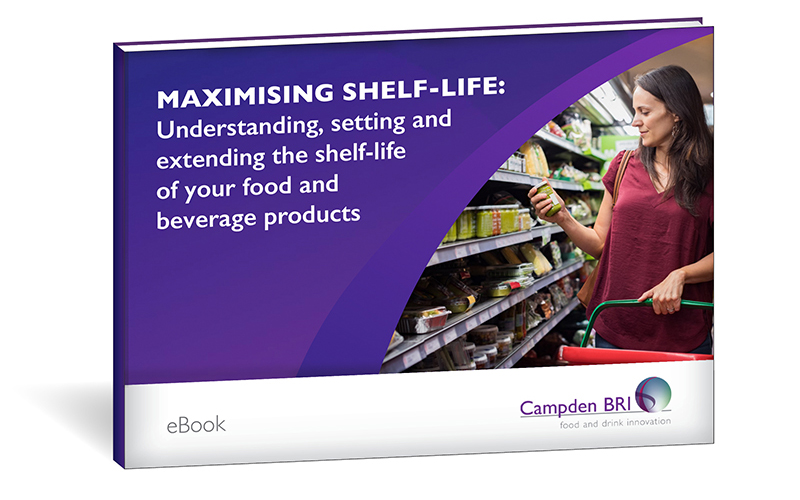
5 reasons to review product shelf-Life
13 April 2023 | Bijol Bakhai, Processing and Storage Food Chemist
The shelf-life of a food or drink product is influenced by its packaging, ingredients, formulation and hygiene, as well as how it is made, processed, packed and stored. Any changes, however small, could impact shelf-life. So the need to periodically review shelf-life for due diligence is no surprise.
Clearly shelf-life needs to be established as part of bringing a new product to market but there are plenty of other reasons why shelf-life may need to be reviewed – to ensure the safety and quality of the final product for the consumer, or to maximise shelf-life and thereby improve efficiency and profitability. Here we cover five of the key drivers for looking at product shelf-life.
Download the complete Maximising Shelf-life eBook, for free, to unlock the tools for measuring and maximising the shelf-life of your food and drink products whilst ensuring their safety and quality.

1. Developing a new product
Shelf-life is best considered early in product development, as this is often the stage where it can be most effectively influenced through product design. Assigning the correct shelf-life is paramount for the commercial success of a product.
If the shelf-life assigned is too long, the product may not meet food safety requirements or the manufacturer’s vision of optimum quality (due to food spoilage or unacceptable levels of particular microorganisms). However, if it is too short (much shorter than is necessary to protect food safety and quality) then this can negatively affect costs, waste, efficiency and profit margins.
2. Changing an existing product
Any changes to formulation, packaging, manufacturing, distribution and storage should trigger a review of both the HACCP plan and the shelf-life of the product, both of which may be influenced by one or more of these factors. Even seemingly unimportant changes could have unexpected consequences to your product’s shelf-life if not properly evaluated, and successive small changes could have a big combined impact.
3. Conducting periodic reviews
Product shelf-life needs to be periodically reviewed (at least annually) regardless of whether or not changes have been knowingly made, and this is in keeping with the periodic reviews required for procedures, HACCP plans, specifications and other elements of an effective food safety and quality management system.
The reviews are to verify that the shelf-life being used is still correct and determine whether it needs to be reassessed. They should include consideration of changes in guidance or legislation, changes to the product itself (see point 2), commercial considerations, consumer complaint information, and whether there is evidence that the indicated storage conditions are not being routinely achieved in practice.
4. Seeking the benefits of a longer shelf-life
Although shelf-life is best considered as part of product development, there are still strategies that you may adopt to extend your product’s shelf-life through reformulation / innovation / renovation of your product’s recipe, processing, packing, packaging and storage.
Increasing the length of a product’s shelf-life may offer improved profit margin, reduced waste, less frequent / larger production runs and increased MLOR (minimum life on receipt) and efficiency, as well as facilitate the geographical expansion of product distribution. Any shelf-life extension project must be carefully considered to ensure that food safety and quality are not compromised.
The validation of a shelf-life extension process and application of the extension strategy will require time and investment from your business. As well as being able to demonstrate the project’s return on investment through a thorough business case, you must ensure that your product will remain feasible and efficient to manufacture and that the shelf-life extension strategy will maintain your product’s integrity, quality and safety.
5. Taking advantage of advances in technology
Since launching your product, new and improved technologies may have been developed that could help to maximise your shelf-life. And, your competitors may be taking advantage of these already.
The packaging used for your product can influence the shelf-life by the extent to which the packaging materials allow the migration of gases, moisture, light and microbial contaminants into the pack. Packaging optimisation is therefore an important part of product development / renovation and will have an effect on shelf-life – potentially extending it if used correctly. For example, packaging that contains an ‘oxygen scavenger’ additive could be used to keep oxygen levels low inside the pack or other additive solutions may be applied to provide improved temperature insulation or an improved barrier against light.
Food processing encompasses all of the activities involved in the transformation of raw ingredients into food products, and many of these can have a significant impact on the achievable shelf-life of a final product. For any of these food processing activities, new / improved technologies may now exist or have become more widely established (and perhaps even more affordable). For example, a more hygienic filling machine, an additional processing step or upgraded chilling equipment could each, where applicable, be applied to improve product shelf-life.
Maximise product shelf-life whilst ensuring safety and quality
To ensure safe product for the consumer, significant expertise and experience are needed to consider all necessary factors for designing a shelf-life validation / testing plan. The same is true for analysing shelf-life data, among other considerations, and setting an appropriate shelf-life for a new product or shelf-life extension.
We provide tailored, expert support in all areas of shelf-life evaluation, maximisation and extension, and have specific expertise in microbiology, chemistry, sensory, regulatory and product innovation services.
Get in touch today to discuss how our experts can identify opportunities to maximise and extend shelf-life, and support their implementation for your new and existing food and drink products.
How can we help?
We have more than 200 scientists and technical experts collaborating on a wide range of projects every day. Get in touch if you’d like their support with a shelf-life project.
Download our FREE Maximising Shelf-life eBook today!
Explore different strategies to maximise and extend product shelf-life, without compromising safety or quality.






